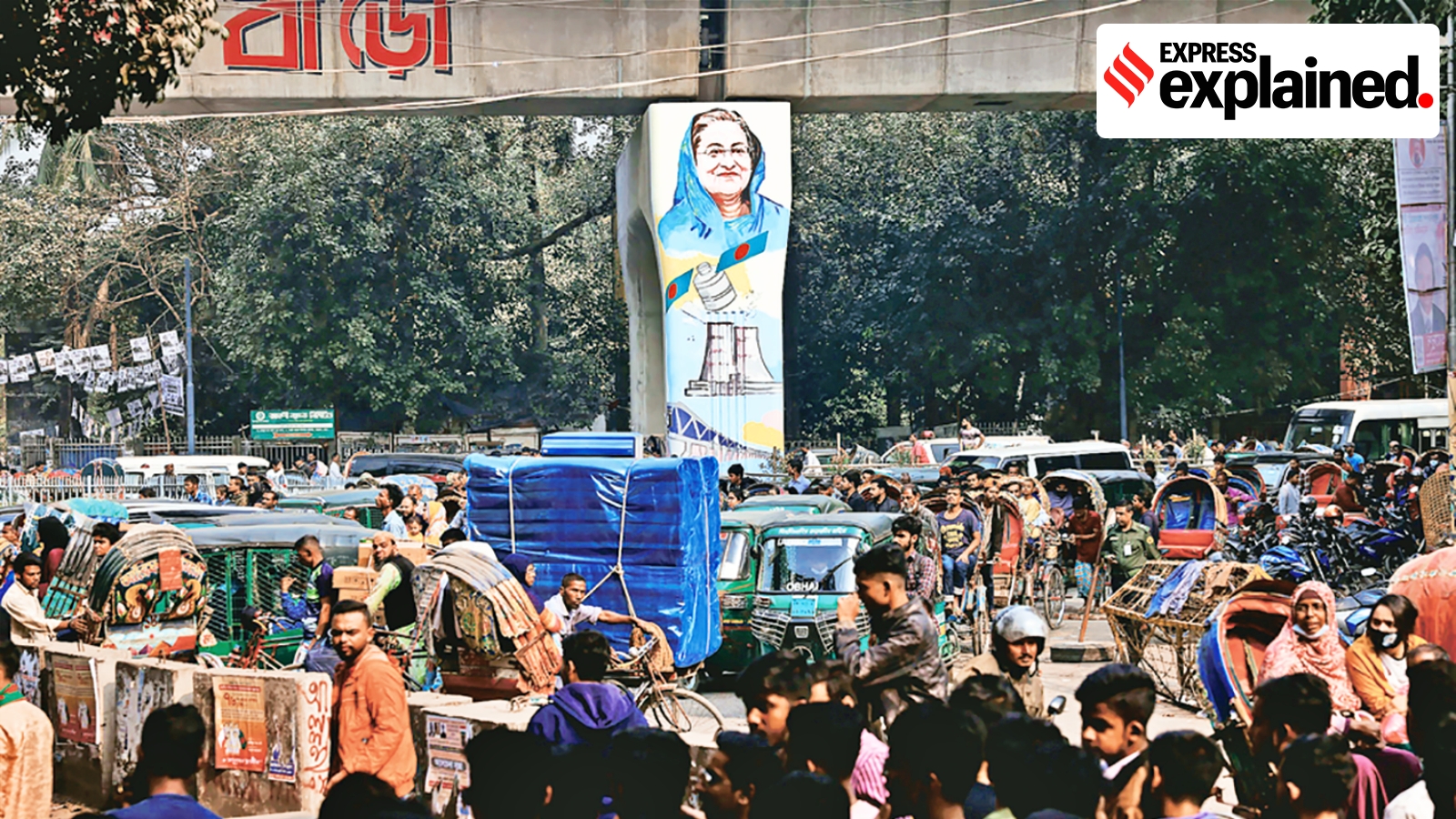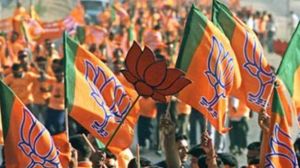Elections in Bangladesh: Everything you need to know
How does Bangladesh’s electoral system work? Which are the major parties contesting (or not contesting? What are the major issues at play? And, most importantly, what is at stake for India?
 People stuck in traffic alongside a metro rail pillar with a graffiti of Sheikh Hasina ahead of the general election in Dhaka, Bangladesh, January 4, 2024. REUTERS
People stuck in traffic alongside a metro rail pillar with a graffiti of Sheikh Hasina ahead of the general election in Dhaka, Bangladesh, January 4, 2024. REUTERSBangladesh goes to polls on Sunday (January 7), with incumbent Sheikh Hasina of the Awami League set to cruise to victory as most opposition parties stage a boycott. What’s behind the boycott, and what is the polls’ significance for India? Here is all you need to know:
How elections work in Bangladesh
Bangladesh’s unicameral legislature body Jatiya Sangsad has 350 members, of which 300 are elected in national elections held every five years. Fifty seats are reserved for women appointed by the ruling party/coalition.
Like India, Bangladesh follows a first-past-the-post system. The Prime Minister is the head of the government, and the most powerful person in the country.
Votes will be cast between 8 am and 4 pm on Sunday. A total of 1,896 candidates are contesting — an average of 6.32 candidates per seat. Roughly 5 per cent of candidates are women.
Which are the major parties in Bangladesh?
While Bangladesh is a multi-party system, it has been a virtual duopoly since the 1990s — the two major parties being the incumbent Awami League and the main opposition Bangladesh Nationalist Party. Since 1991, AL has enjoyed four terms in power, while BNP has led the government twice.
AL was founded in 1949 by Bangladeshi nationalists as an alternative to the Muslim League in East Pakistan. Under Sheikh Mujibur Rahman, the AL led the struggle for Bangladesh’s independence. Sheikh Hasina, who has been Prime Minister since 2009, is Mujib’s daughter.
The BNP was founded in 1978 by Ziaur Rahman, a former army general. After Ziaur was assassinated in 1981, his wife Khaleda Zia led the party until 2018, when she was put in jail. She has been under house arrest since 2020. The BNP is currently headed by Khaleda’s son Tarique Rahman, who lives in exile in London.
The BNP has been in disarray over the past several years and, despite a seeming resurgence since 2022 amidst a growing anti-Hasina sentiment, has been written off by many. The BNP is boycotting the elections; Tarique has called it a “sham” with a “predetermined outcome”.
The third largest party in Bangladesh is the Jatiya Party (Ershad), which currently has 27 seats in the Jatiya Sangsad. It will contest the upcoming elections.
Issues at play
In an election that most observers anticipate will be one-sided, the major issue is the fairness of the election process.
Elections under Bangladesh’s partisan governments have always been controversial — from Mujib’s victory in 1973 to the elections held under Ziaur in 1979, and then under H M Ershad in 1986 and 1988, to those held in 1996, 2014, and 2018.
This is why a caretaker government system was instituted in 1990, and the 1991 elections under the government of Justice Shahabuddin Ahmed were viewed as the fairest yet. Elections held in 1996 (after Khaleda’s 12-day rule), 2001, and 2008, all under caretaker governments, were considered fair both domestically and internationally.
However, after the army-backed caretaker government far exceeded its remit in 2006-07 — sending hundreds of politicians, including Hasina and Khaleda, to prison on charges of corruption and abuse of power — Hasina decided to do away with the system in 2011. “We cannot allow unelected people to oversee national elections,” she had said.
But the opposition has alleged that this has only allowed her to continue to rig elections in Bangladesh, and stamp out all opposition. The BNP has been boycotting elections since 2014, and had run a campaign focussed on bringing back the caretaker system last year.
The state of the economy could be a factor in the elections as well. While Hasina has been credited with taking Bangladesh’s economy to a good place, the cost of living has jumped as the country struggles to pay for costly energy imports amid weakening domestic currency and depleting dollar reserves.
In December last year, the International Monetary Fund cleared the first review of the country’s $ 4.7 billion bailout, providing immediate access of $ 468.3 million.
What India wants
Despite Hasina’s autocratic tendencies, she remains a firm friend of India, and New Delhi’s preferred candidate to lead Bangladesh.
Her relationship with India dates back to the 1970s, when India was the biggest backer of Bangladesh’s liberation movement, led by her father Mujib. Her four terms in power have been extremely fruitful in furthering the India-Bangladesh relationship — most border issues have been sorted, economic cooperation has been furthered, and most importantly, Hasina has firmly supported India’s national security interests.
Crucially, the major alternative to Hasina, Khaleda Zia’s BNP, is an absolute no-no for India. During Khaleda’s reign, Bangladesh became a safe haven for terrorist and militant outfits with anti-India designs, as she let Islamist radicals share power. Supported by Pakistan’s ISI, these outfits terrorised Northeast India and the Bangladesh border.
Moreover, clashes at the Bangladesh border became increasingly frequent. In 2001, Bangladeshi paramilitary troops killed and mutilated 16 BSF guards in a border clash.
Hasina, on the other hand, has been steadfast in her commitment to keep the ISI and Islamist radicals out of power in Bangladesh, especially since a 2004 assassination attempt which was orchestrated by radical Islamist outfits, including the Jamaat, which was a part of the BNP government at the time.
- 01
- 02
- 03
- 04
- 05






































